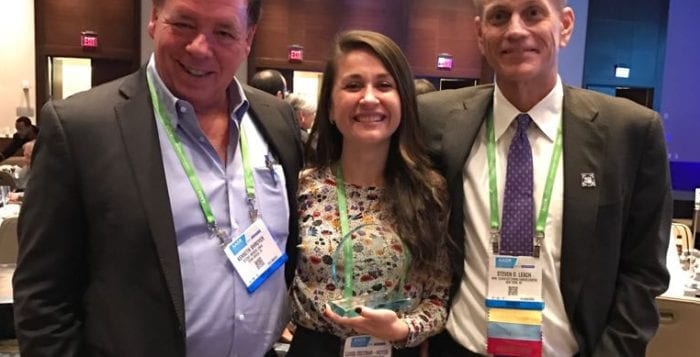SBU’s Escobar-Hoyos wins $600K for pancreatic cancer research

By Daniel Dunaief
While winter storm Niko in February closed schools and businesses and brought considerable precipitation to the region, it also coincided with great news for Luisa Escobar-Hoyos, who earned her doctorate from Stony Brook University.
Escobar-Hoyos, who is a part-time research assistant professor in the Department of Pathology at Stony Brook University and a postdoctoral fellow at Memorial Sloan Kettering Cancer Center, received word that she was the sole researcher selected in the country to receive the prestigious $600,000 Pancreatic Cancer Action Network–American Association for Cancer Research Pathway to Leadership Award.
When she heard the news, Escobar-Hoyos said she was “filled with excitement.” After she spoke with her husband Nicolas Hernandez and her current mentor at MSKCC, Steven Leach, the director of the David M. Rubenstein Center for Pancreatic Cancer Research, she called her parents in her native Colombia.
Her mother, Luz Hoyos, understood her excitement not only as a parent but as a cancer researcher herself. “My interest in cancer research started because of my mom,” Escobar-Hoyos said. Observing her example and “the excitement and the impact she has on her students and young scientists working with her, I could see myself” following in her footsteps.
The researcher said her joy at winning the award has blended with “a sense of responsibility” to the growing community of patients and their families who have developed a deadly disease that is projected to become the second leading cause of cancer-related death by 2020, according to the Pancreatic Cancer Action Network, moving past colorectal cancer.
The Pancreatic Cancer Action Network has awarded $35 million in funding to 142 scientists across the country from 2003 to 2016, many of whom have continued to improve an understanding of this insidious form of cancer.
David Tuveson, the current director of the Cancer Center at Cold Spring Harbor Laboratory, received funds from PanCan to develop the first genetically engineered mouse model that mimics human disease. Jiyoung Ahn, the associate director of the NYU Cancer Institute, used the funds to discover that two species of oral bacteria are associated with an over 50 percent increased risk of pancreatic cancer.
Over the first decade since PanCan started awarding these grants, the recipients have been able to convert each dollar granted into $8.28 in further pancreatic cancer research funding.
In her research, Escobar-Hoyos suggests that alternative splicing, or splitting up messenger RNA at different locations to create different versions of the same protein, plays an important part in the start and progress of pancreatic cancer. “Her preliminary data suggest that alternative splicing could be associated with poorer survival and resistance to treatment,” Lynn Matrisian, the chief science officer at PanCan, explained in an email. “The completion of her project will enhance our understanding of this molecular modification and how it impacts pancreatic cancer cell growth, survival and the progression to more advanced stages of this disease.”
Escobar-Hoyos explained that she will evaluate how mutations in transcriptional regulators and mRNA splicing factors influence gene expression and alternative splicing of mRNAs to promote the disease and aggression of the most common form of pancreatic cancer. Later, she will evaluate how splicing regulators and alternatively spliced genes enriched in pancreatic ductal adenocarcinoma contribute to tumor maintenance and resistance to therapy.
Escobar-Hoyos will receive $75,000 in each of the first two years of the award to pay for a salary or a technician, during a mentored phase of the award. After those two years, she will receive $150,000 for three years, when PanCan expects her to be in an independent research position.
Escobar-Hoyos said her graduate research at Stony Brook focused on ways to understand the biological differences between patients diagnosed with the same cancer type. She helped discover the way a keratin protein called K17 entered the nucleus and brought another protein into the cytoplasm, making one type of tumor more aggressive.
While Escobar-Hoyos works full time at Memorial Sloan Kettering, she continues to play an active role in Kenneth Shroyer’s lab, where she conducted experiments for her doctorate. She is the co-director of the Pathology Translational Research Laboratory, leading studies that are focused on pancreatic cancer biomarkers. The chair in the Department of Pathology, Shroyer extended an offer for her to continue to address the research questions her work addressed after she started her postdoctoral fellowship.
“When you do research projects and you develop them from the beginning, they are like babies and you really want to see how they evolve,” Escobar-Hoyos said. Numerous projects are devoted to different aspects of K17, she said.
Shroyer said Escobar-Hoyos had already been the first author on two landmark studies related to the discovery and validation of K17 even before her work with pancreatic cancer. “She has also conducted highly significant new research” that she is currently developing “that I believe will transform the field of pancreatic cancer research,” Shroyer wrote in an email.
Shroyer hopes to recruit Escobar-Hoyos to return to Stony Brook when she completes her fellowship to a full-time position as a tenure track assistant professor. “Based on her achievements in basic research and her passion to translate her findings to improve the care of patients with pancreatic cancer, I have no doubt she is one of the most promising young pancreatic cancer research scientists of her generation,” he continued.
Yusuf Hannun, the director of the Stony Brook Cancer Center, said Escobar-Hoyos’s work provided a new and important angle with considerable promise in understanding pancreatic cancer. “She is a tremendous example of success for junior investigators,” Hannun wrote in an email.
Escobar-Hoyos said she is hoping, a year or two from now, to transition to becoming an independent scientist and principal investigator, ideally at an academic institution. “Because of my strong ties with Stony Brook and all the effort the institution is investing in pancreatic research” SBU is currently her first choice.
Escobar-Hoyos is pleased that she was able to give back to the Pancreatic Cancer Action Network when she and a team of other friends and family helped raise about $4,000 as a part of a PurpleStride 5K walk in Prospect Park earlier this month.“I was paying forward what this foundation has done for me in my career,” she said.
Matrisian said dedicated scientists offer hope to patients and their families. “Researchers like Escobar-Hoyos spark scientific breakthroughs that may create treatments and ultimately, improve the lives of patients,” she suggested.






